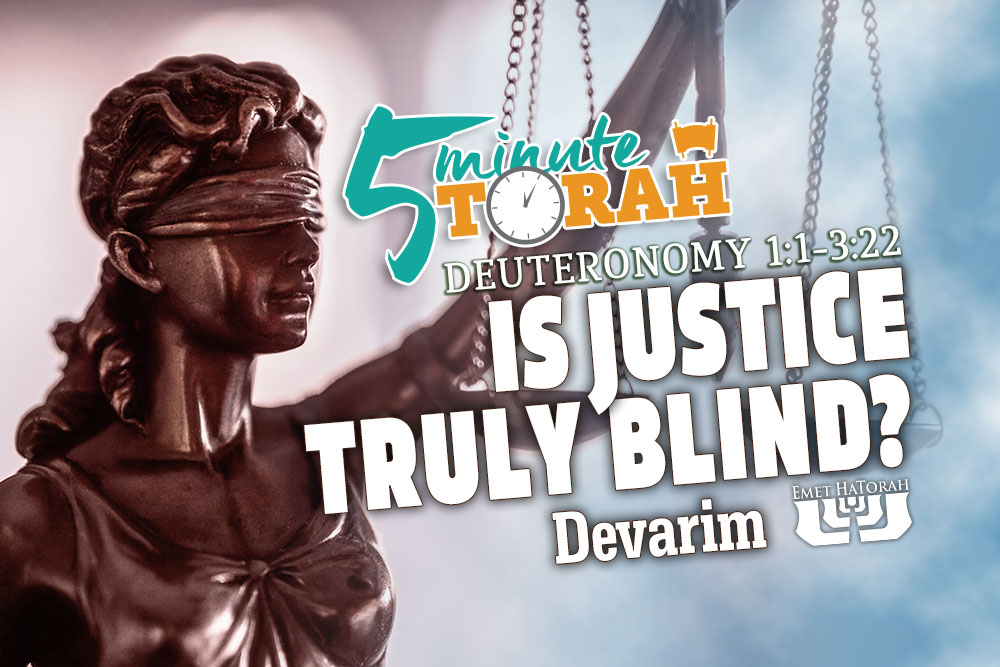Is Justice Truly Blind?
Series:

Parashat Devarim - Deuteronomy 1:1-3:22
The book of Devarim (Deuteronomy) is often called Mishneh Torah, or the “second law,” due to it’s repetition of many of the things already expressed within the first four books of Torah. However, it does not merely recount the same events and dialogues, but adds detail and clarification to the previous events. When recalling the appointment of judges Moses gives a detail not found previously in the Torah:
You shall not be partial in judgment. You shall hear the small and the great alike. You shall not be intimidated by anyone, for the judgment is God's. (Deuteronomy 1:17)
Yes, there are several instances prior to this that address the issue of being impartial in judgment, such as Leviticus 19:15, “You shall do no injustice in court. You shall not be partial to the poor or defer to the great, but in righteousness shall you judge your neighbor.” But until now we haven’t been exposed to this specific language. What are “the small and the great”? Are they small and great cases, or small and great people? The Torah does not specify, so it is left up to interpretation. Both Rashi and Targum Onkelos understand it to mean small and great people. Judges are not to show favoritism among litigants.
Judging with impartiality is crucial to a fair and legitimate system of justice. Even the popular image of Lady Justice, the personification of justice, bears a blindfold in many instances to represent this basic requirement expected of those in seats of judgment. Yeshua taught, “Do not judge by appearances, but judge with right judgment” (John 7:24).
In order to maintain equity in judgment, judges must fear God more than man. When King Jehoshaphat began his reforms in Judah, one of the first things he did was to appoint righteous judges. He sternly admonished them in this same manner, “Consider what you do, for you judge not for man but for the LORD. He is with you in giving judgment. Now then, let the fear of the LORD be upon you” (2 Chronicles 19:6–7).
Midrash Tanchuma (Mishpatim 6:11) quotes Rabbi Jonathan declaring that the very presence of God is either welcomed or rejected through the proper verdicts of Israel’s judges:
Every judge who renders a just verdict causes the Shechinah to hover over Israel, as it is said: “God stands in the congregation of God; in the midst of the judges He judges” (Psalm 82:1). But every judge who renders an unjust verdict causes the Shechinah (the Divine Presence) to depart, as it is said: “For the oppression of the poor, for the sighing of the needy, now will I arise, says the LORD” (Psalm 12:6).
Rashi, however, commenting on this verse, brings up a good point. How do we reconcile this issue of impartiality with the fact that even minor judgments against the poor could be devastating? And it seems that Scripture frequently advises judging in favor of the poor. Proverbs tells us, “Open your mouth, judge righteously, defend the rights of the poor and needy” (Proverbs 31:9). Isaiah, when speaking of the Messiah, says, “with righteousness he shall judge the poor, and decide with equity for the meek of the earth” (Isaiah 11:4). James, the brother of our Master, contends, “Are not the rich the ones who oppress you, and the ones who drag you into court? Are they not the ones who blaspheme the honorable name by which you were called?” (James 2:6–7). How do we contend with passages such as these?
Rashi knows that there will be judges who are tempted to side in favor of the poor, simply because of their social and financial status. But he also realizes that there might be judges who are tempted to rule in favor of the rich in principle, but would overextend their authority to have them reimburse the expenses of the poor after the trial. Neither of these situations, however, are acceptable according to the Scriptures. God is a god of justice, and if there is partiality in judgment the whole system collapses. From the beginning, Moses reminds us that “the judgment is God's.” Those in authority are to judge with equity and without partiality.
Is justice blind? It shouldn’t be blind to the truth or the facts that help determine the proper course of action. However, it should be blind to the status of the litigants. Whether we are coming before a human judge or the Divine Judge, we all begin on equal ground. One day Yeshua will judge the world with equity, as he told his disciples, “I can do nothing on my own. As I hear, I judge, and my judgment is just, because I seek not my own will but the will of him who sent me” (John 5:30). Until that time appears, we pray three times a day for righteous judges to rule over us:
Restore our judges as at first and our counselors as at the beginning, and remove from us sorrow and groan. May You, LORD, alone reign over us with kindness and compassion and justify us with judgment. Blessed are You, LORD, the King who loves righteousness and judgment.
May the Righteous Judge return to establish his rule in our days. Maranatha!








